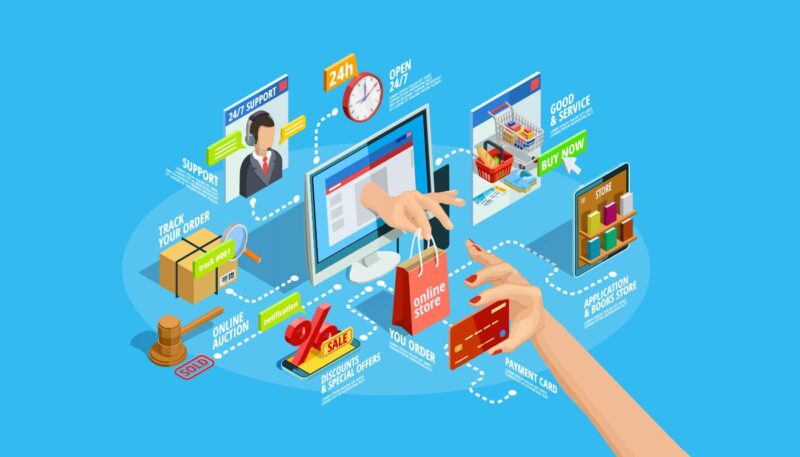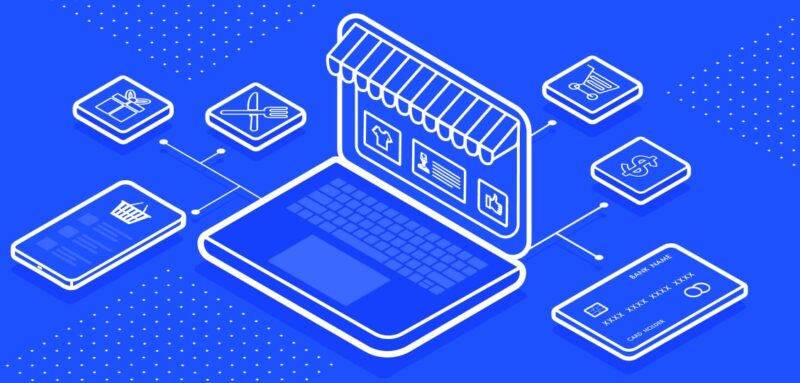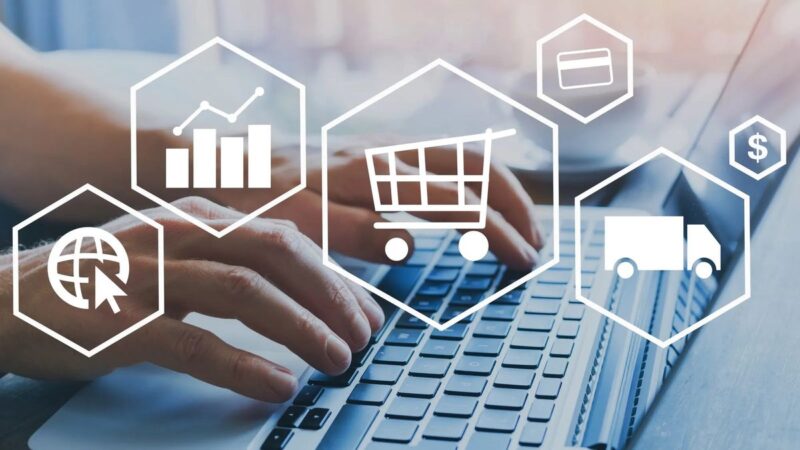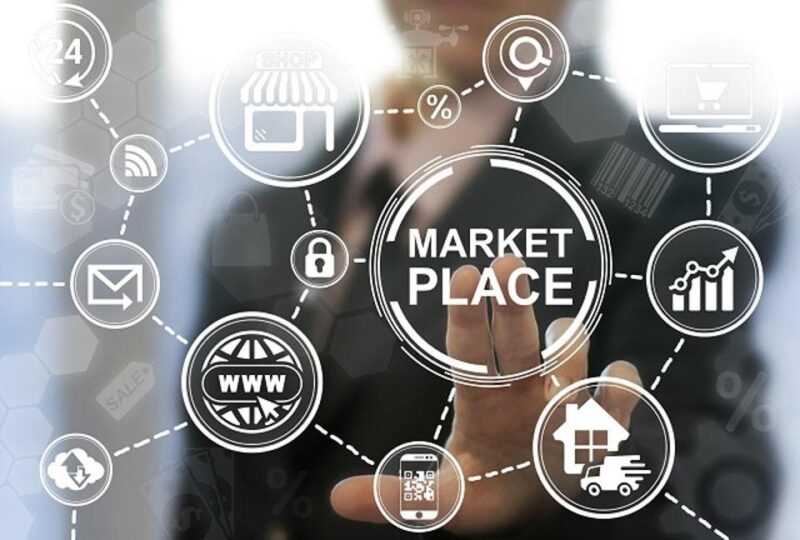The modern business sphere offers multiple types of reaching a target audience and building relations between sellers and customers. Along with online and offline stores, marketplaces have come as an effective method of reaching clients. In the article, we’re going to focus on the issue “Marketplace – what is it?”. Our experts will explain the specifics and peculiarities of this form of business relations.
What is a Marketplace: Definition & History of Evolution

The marketplace is a place or platform, where different sellers offer their services or goods to buyers. These are multi-vendor locations (whether online or offline), where consumers can find a great variety of products from children’s toys to car parts, etc. If compared to offline or online stores, marketplaces differ due to the following features:
- They offer products from multiple vendors, while stores are single-seller places.
- Trading platform owners do not have their own inventories since each vendor has his own inventory and is responsible for it himself.
- Trading platform owners do not sell but mostly promote goods and services.
- Although their structure seems to be rather complex due to the presence of multiple vendors, in fact, such trading platforms are perfectly scalable and lean for startups.
Thus, the main objective of marketplaces is to act as an intermediary in bringing together the right vendor with the right customer. That is, they come as a key chain for building seller and buyer interaction.
Bazaars were prototypes of modern marketplaces that appeared dozens of years ago. However, with the rise of digital technologies and increasing attention to global e-commerce, online marketplaces started to appear. This is why, today, society observes different types of trading platforms.
Types of Marketplaces

To answer the question “What is a marketplace company?”, it’s necessary to realize what types of businesses exist on the market. Nowadays, trading relations occur both offline and online, which creates a breed for the development of business in two realities. Thus, in their broad sense, marketplaces fall into two major types, namely, physical and digital ones.
- A physical marketplace is an offline location, where customers can go and observe goods physically (touch, try, choose, etc.). Common examples of physical marketplaces are shopping malls and bazaars. Such options feature high product visibility and the ability to assess its state in reality, which comes as the main advantage.
- A digital or online marketplace is an e-commerce platform, where buyers can make purchases online. These can be app stores or web stores with multiple sellers. The most popular examples include eBay, Amazon, Wildberries, etc. Such solutions boast easy accessibility and comfort of shopping.
For sellers navigating these marketplaces, Seller Candy offers expert support that helps streamline operations, resolve issues quickly, and optimize overall store performance.
Note that according to another classification of the embraced territory, they fall into local and global marketplaces. Physical options are usually local since they cater to the needs of nearby dwellers, while digital options serve globally and feature a wider coverage.
Key Features of Such Trading Platforms
If compared to other forms of business, marketplaces have 3 distinctive characteristics that point them out from other options:
- Variety of sellers and buyers. The main feature of such trading platforms is the large number of sellers who offer their services, which results in wider customer reach. Since they offer a wide range of multi-purpose “shops”, they are able to satisfy the demands of multiple consumers, which extends their target audience and ensures a big flow of customers.
- Platform for transactions. If we consider online trading platforms, digital transactions are well-organized on such platforms. They support different banking methods for payment processing. These include bank cards, e-wallets, vouchers, etc. The latest marketplace innovation includes the introduction of blockchain in marketplaces, which allows for paying for goods with crypto assets. Some platforms even integrate live crypto conversions such as DOGE to USD to help buyers and sellers track real-time values more accurately. Still, a rich variety of available payment solutions allows for meeting the demands of all consumers and ensuring secure peer-to-peer transactions.
- Mechanisms for feedback and dispute resolution. User reviews and ratings are used to increase consumers’ loyalty, trust, and security. Effective dispute resolution through customer support managers helps ensure trusted seller and buyer interaction.
Note that to develop a marketplace, you need a modern platform that runs smoothly and meets web requirements. If you need marketplace development services, visit the website https://evrone.com/solutions/marketplace and turn to professional specialists in this sphere. They will consult you and develop modern customizable solutions for your demands.
Advantages of Marketplaces

- Access to a broad audience. The ability to satisfy the demands of numerous consumers allows for embracing a wider target audience and achieving higher reach.
- Convenience and efficiency. Customers can find and buy all they need in one place.
- Competitive pricing. A wide product diversity creates a highly competitive environment, where sellers do not overestimate the cost of the provided goods or services.
Challenges Facing Marketplaces
Despite all the mentioned benefits and peculiarities, such trading platforms face particular challenges, such as:
- Ensuring quality and trust. When buying online, customers cannot assess the quality of purchased goods, meaning that the risk of buying poor-quality products always exists.
- Handling logistics and payments. Marketplace logistics is a complex network of interconnected work teams that ensure timely delivery of purchased goods. However, consumers should always be ready for emergency cases during transportation.
- Regulatory compliance. Due to the specifics of state laws, global marketplace regulation is questioned. It should act in accordance with state laws of all the countries it caters to.
The Future of Marketplaces

Despite the mentioned challenges, experts predict a further growth of the number and popularity of such trading platforms. Moreover, new digital solutions will be introduced, namely:
- Technology integration (e.g., AI, blockchain). AI in marketplaces allows for streamlining transaction and purchase processing. Routine, repeated actions are entrusted to AI, which allows for improving marketplace efficiency and saving time for other tasks. For instance, AI can collect and analyze customer data and feedback.
- Niche marketplaces. To narrow specialization, niche trading platforms are expected to appear. They will gather a wide variety of products from different suppliers for particular needs. For instance, platforms for auto parts, clothes, or gardening.
- Global expansion and localization. While some platforms are focused on particular geo-regions, others will struggle to embrace different regions and achieve global presence and recognition.
Now, you know the answer to the question “What is a marketplace?”. Remember that it’s a modern solution for building reliable and long-term interaction with consumers. In the future, more and more vendors will join them so it’s uptime to jump on this train.

